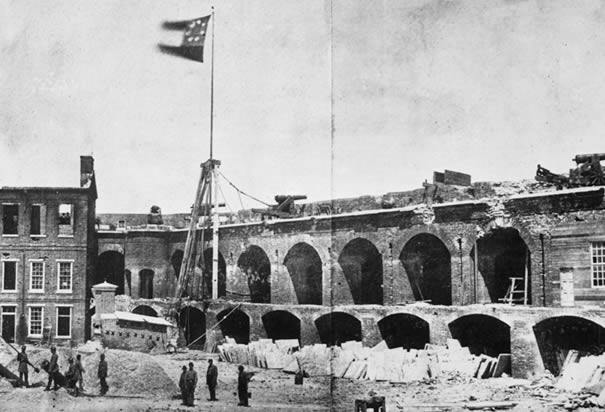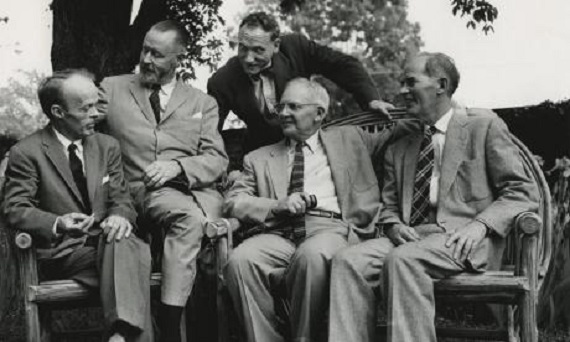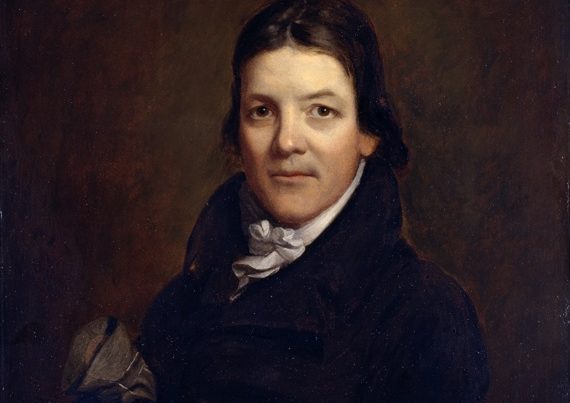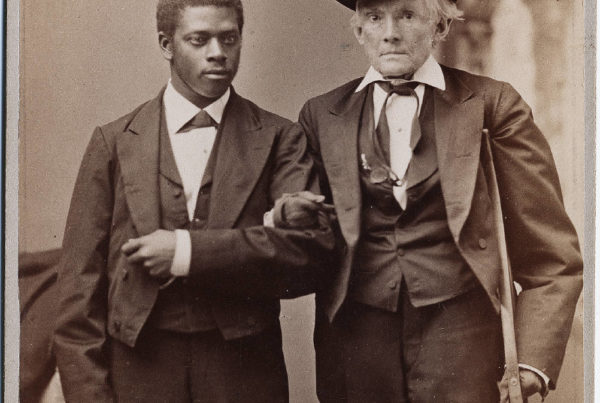“O wad some Pow’r the giftie gie us
To see oursels as others see us!”
—Robert Burns
Not long ago, a well-known conservative historian lamented that the American public had not been morally engaged to undergo sacrifice after the 9/11 attacks, unlike their heroic predecessors after Fort Sumter and Pearl Harbour.
Wait a minute. Pearl Harbor and 9/11 were massive sneak attacks by foreign enemies. The reduction of Fort Sumter was preceded by a gentlemanly warning, was bloodless, and the garrison was allowed to depart with honour. It would not have happened at all if Lincoln had not dissimulated about re-enforcements. Think about this. Why should Southerners (free Americans) permit a fort that had been built with their tax money for their protection to be used as a base to conquer and extort taxes from them? When every other federal post in the South had already been peacefully surrendered pending a political settlement. One can become outraged at Fort Sumter only by placing a higher value on the will of the political party controlling the machinery of government than on the core purpose of a free regime to protect the people.
Nor did Lincoln’s call after Fort Sumter for 75,000 troops to suppress “the rebellion” at all evoke American unity and determination like that after Pearl Harbour. The call for troops was illegal and the 75,000 was either a deliberate deception or the most terrible mistake in American history, since over a million men were eventually required to complete the conquest of the Southern people and the destruction of their self-government. The immediate effect of Lincoln’s mobilization was to drive four more states out of the Union, put the Border States into bloody play, and require military rule in much of the North such as was unprecedented in American experience. And ultimately to require systematic terrorism against noncombatants that is still a source of shame for all decent Americans. It is true Lincoln got a temporary boost of morale from having forced the Confederacy to “fire on the flag,” but that did not last. The number of Northern men who evaded service in Mr. Lincoln’s war in one way or another was in the hundreds of thousands, and more Northerners voted against him in 1864 than had in 1860, even though the army was used to control the polls.
One wonders that the historian mentioned would even allow Southerners to fight beside real Americans in later wars since he equates Lee and Jackson with Tojo and Bin Laden. Perhaps it has always been this way in Boston, which happens to be the location of the scholar referred to. But in general it has not always been so. Franklin Roosevelt had no objection to being photographed with Confederate flags. Harry Truman chose a romantic equestrian portrait of Lee and Jackson for the lobby of his Presidential Library. Dwight Eisenhower went out of his way to correct someone who called Lee a “traitor,” and John Kennedy chose Calhoun as one of the five greatest Senators.
For a long time Americans North and South observed a Truce. It was agreed that The War was a great tragedy with good and bad on both sides, from which a stronger and better country had emerged. In this scenario, Lincoln is the great martyred Peacemaker who would have “bound up the nation’s wounds” and avoided the evils that followed armed conflict. This is a dubious proposition, but one in which it was useful for all parties to believe.
As Southerners well know, things have changed in the last few years. There is a concerted effort to banish the South into one dark little corner of American history labeled “slavery” and “treason.” For our purposes here in the Lincoln bicentennial, we can note that there has been an accompanying literature that celebrates Lincoln not as the Peacemaker but as the great Conquering Revolutionary who used any means to eliminate evil and promote change. Which accompanies and justifies America’s turn toward a mission to impose “global democracy” by unlimited force and pre-emptive war. Even General Sherman is once more being celebrated as a great military hero for his ruthless campaigns against civilians. (There has been a counter-trend, exemplified not only by Thomas DiLorenzo’s and Ronald and Donald Kennedy’s best-selling books but by a number of solid monographs exploring the uglier aspects of Northern motives and actions in The War. If my email correspondence from above the Potomac and Ohio is any measure, a great many non-Southern Americans now regard Lincoln as the fount of the excessive centralisation and the aggressive war that they deplore.)
In 1961, during the Civil War centennial, Robert Penn Warren published a little book called The Legacy of the Civil War. He had some critical things to say about the tendency of his fellow Southerners to use The War as an excuse to avoid remedying their shortcomings. But for our purposes, what he had to say about the American majority is more pertinent. The éclat of having “saved the Union” and freed the slaves had left Northerners with “a Treasury of Virtue.” This is a kind of plenary indulgence that automatically pre-justifies the motives of American violence and the goodness inherent in America’s acts to force the world into conformity with its ideal version of itself. Decide for yourself the degree of truth in Warren’s observation as it applies to the current American posture in the world.
The Treasury of Virtue renders Americans immune to a simple truth. The War was a war of conquest. It was not a righteous crusade or a family spat. Government of the people would not have suffered if a war of coercion had not been launched against the Southern people. The opposite is true. The purpose of the war was fundamentally to protect the prosperity of the ruling elements of the Northern states by keeping the South captive as a market and a source of raw materials and exports. The primary result of the Republican party victory was permanent installment of Hamilton’s blessings—a national debt, a protected market for industrialists, and a collusion between bankers and politicians.
Orestres Brownson, a strong supporter of the Union, lamented afterwards that the war had not been sustained by patriotism—but by patronage, profit, and a trumped up hatred of Southerners. Northern support for Lincoln was not nearly as widespread and fervent as our Boston historian would have it. Recent study has raised doubt as to whether Lincoln could have maintained his armies if there had not been widespread industrial unemployment at the beginning of the war, an immense expenditure on enlistment bounties, and unlimited access to foreign recruits.
Since the mid-20th century Americans have been obsessed with race and it has become de rigueur to declare that The War was about slavery and nothing but slavery. Earlier generations knew better. Emancipation of the slaves was not a purpose but a by-product of the conquest of the South. The mass of the Northern public and army was far more anti-black than it was anti-slavery, and the destruction of the South was as hard or harder on the black population than on the white. The notion that soldiers in blue and emancipated slaves rushed into each other’s arms with shouts of Hallelujah is pure fantasy. Nor was slavery (domestic servitude) in 1860 at all the horror that it is now imagined to be. In 1860 in New York City there were women and children working 16 hour days for starvation wages, 150,000 unemployed, 40,000 homeless, 600 brothels (some with girls as young as 10), and 9,000 grog shops where the poor could temporarily drown their sorrows. A Southern planter who reflected on the circumstances in which he had been born, observed the everyday life around him, and examined his Christian conscience, saw no reason to forever meekly accept the hatred and abuse of strangers who claimed moral authority over him.
In American tradition and understanding, secession should have been an occasion for Constitutional negotiations such as the Confederate government sought, especially by a President whose position, ambiguous and two-faced as it was, had the support of less than 40 per cent of the people. Instead, Lincoln declared that the solemn, constitutional, democratic acts of the people of eleven States were merely combinations of criminals too numerous to be put down by the marshals. He supported his position by a false American history and the transparent lie that the “people” did not really support their States. That day the Constitution died as a governing document for the people and their statesman. It became a mere rule of thumb for politicians and lawyers, who continue Lincoln’s heritage of twisting it to suit their ends. After all, the Constitution defines rebellion against the United States as waging war against “them,” not as resisting the government. It was Lincoln who was engaged in a rebellion to overthrow the Union. He had to dispense with the real Constitution because it not only disallowed a war of coercion against Americans but also most of the acts of central power in favour of private profit that his party was determined to make permanent.
In fact, Lincoln’s campaign to “retake the seditious states” could only rest on the tacit assumption that the Southern states, their land, resources, and people, were and always had been the property of the federal government; or more properly, of the politicians who had got control of the federal machine. And that the South existed not for itself as a self-governing part of America but for the benefit and disposition of the North. The consent of the people could only be given one time and ever after they were bound to obey to the federal machine. Thus the primary principle of the Declaration, that governments rest on the consent of the governed, was abolished. The Union was not preserved and it could not have been under such assumptions, any more than a marriage can be properly preserved by battery. It was changed into something else.
Lincoln’s pretty words in the Gettysburg Address managed to have it both ways—he was, he claimed, preserving the sacred old Union and at the same time promulgating a new birth of freedom that was somehow necessary to save government of the people. But these were not the arguments normally used by the spokesmen of his party to justify their war. They spoke instead of conquest and authority and punishment of disobedience to their designs. This is not a Southern accusation, it is the overwhelming evidence of their own words, both public and private. Karl Marx agreed enthusiastically with Lincoln’s interpretation of the Declaration of Independence, proclaiming the war to be a rebellion of “slave drivers” against the “one great democratic republic whence the first Declaration of the Rights of Man was issued.” Marx also regarded it as a rebellion against progressive German immigrants who somehow were better Americans than the Southern sons of patriots and founders.
It is unlikely, but if Americans could ever come to recognise and admit how much counterfeit is contained in their Treasury of Virtue, then they could have a more realistic view of themselves and play a more humble and responsible role in the world.
SOURCE: A slightly different version appeared in Chronicles Magazine.







